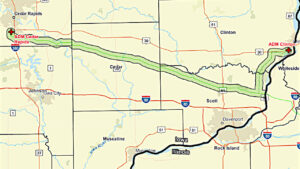
A proposed Linn County ordinance primarily designed to regulate setbacks from pipelines carrying hazardous materials is on its way to the Linn County Board of Supervisors for consideration.
The proposed ordinance was approved by the county’s planning and zoning commission in their meeting Monday night, Nov. 21. The commission’s vote was 5-1, with commissioner Griffin Kuntz casting the lone nay vote. Commissioner George Maxwell was not present at the meeting.
Linn County Planning and Zoning director Charlie Nichols said the ordinance specifically addresses safety setbacks from hazardous materials pipelines, since unlike pipelines carrying natural gas – which are regulated by the Iowa Utilities Board – hazardous materials pipelines are regulated by the U.S. Department of Transportation’s Pipeline and Hazardous Materials Safety Administration (PHMSA).
That agency, Mr. Nichols said, governs construction of hazardous material pipelines but hasn’t yet issued guidelines for oversight of safety issues.
“What we are attempting to do here is reduce the risk of damage and injury to Linn County’s public through regulations to supplement the Iowa Utilities Board’s permitting process, in the absence of updated guidance from PHMSA,” Mr. Nichols said.

There are three companies proposing liquid carbon dioxide sequestration pipelines in Iowa, Mr. Nichols said. One of those companies, Wolf Carbon Solutions, is proposing a liquid CO2 pipeline that would run through several Eastern Iowa counties, including the southeast portion of Linn County.
Under the proposal, Wolf would build a 280-mile carbon dioxide sequestration pipeline between Cedar Rapids and Decatur, Illinois. The pipeline, referred to as the Mt. Simon Hub, would transport liquefied CO2 through a pressurized 16-inch pipeline from ADM plants in Cedar Rapids and Clinton to an ADM sequestration facility near Decatur, Illinois, where the gas would be pumped underground at the Mt. Simon Sandstone saline reservoir for permanent storage.
Pipeline safety incidents are relatively rare in Iowa, with less than 5 per year in the state on average, and most are minor leaks caused by construction crews or pipeline corrosion issues. By contrast, Mr. Nichols pointed out the well-publicized explosion of the Denbury Gulf Coast carbon dioxide pipeline near Satartia, Mississipp in February 2020 that led to the hospitalization of nearly 50 local residents and the evacuation of 300 others, as an example of what could happen with hazardous material pipelines in Iowa.
The county’s ordinance proposed two setback standards. One standard, which would apply to places of public assembly such as hospitals, schools, detention centers, parks and playgrounds, would mandate a setback of 155.8 feet times times the pipeline’s diameter, or just under 2,500 feet for a 16-inch pipeline. A second standard for dwellings would mandate a setback of 107.65 feet times the diameter of the pipeline plus 328.08 feet, or approximately 2,050 feet for a 16-inch pipeline. A separate setback standard is also proposed for future growth areas of Linn County, Mr. Nichols said.
The proposal is designed to protect Linn County residents without pre-empting the Iowa Utilitlies Board’s decision-making authority, Mr. Nichols said.
“This has not been easy to balance both of those things, especially in this case,” Mr. Nichols said. “And I think there’s a better than zero chance that the county will face lawsuits over this from pipeline companies. We’ve seen other counties be taken to court over their regulations. We are trying very very hard to (the regulations) reasonable while still increasing or providing that safety measure in the absence of updated PHMSA regulation.”
In response to a question from the board, Mr. Nichols said it’s not yet clear if the IUB could supersede the county’s regulations regarding pipeline setbacks. He also said he’s not aware of how pipeline companies would feel about the ordinance.
“We don’t have a reaction from the pipeline company yet,” Mr. Nichols said. “We’ve seen other counties adopting similar regulations and then being sued immediately. So I would guess that it’s not a favorable reaction, but I’m hopeful that we’re building in safety valves where setbacks can be waived, with the city’s permission or homeowners’ permission, where a pipeline company is still able to get their project done … We have received a steady stream of communication to our office that’s opposed to the pipeline. I don’t know that we’ve received any communication that is pro pipeline at this point.”
The board of supervisor’s first consideration of the proposed ordinance is set for Dec. 5.




